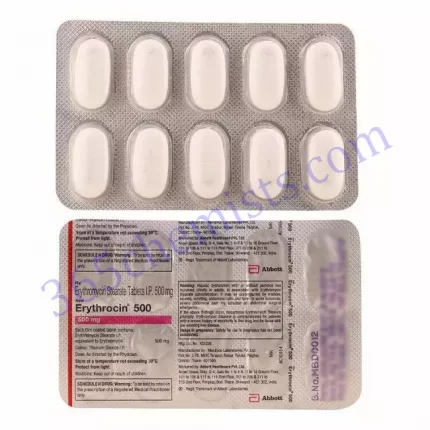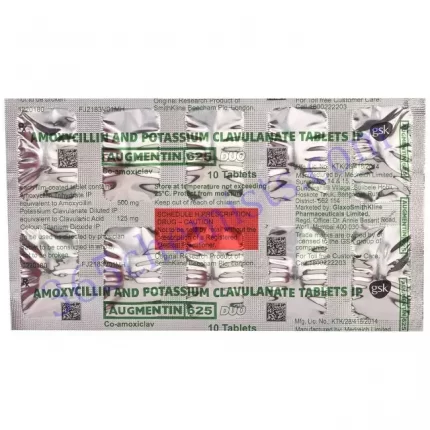Erythrocin 250mg Tablet (Erythromycin): A Reliable Antibiotic for Bacterial Infections
Erythrocin 250mg Tablet is an effective antibiotic medication that is used for the treatment of bacterial infections. Its active ingredient is erythromycin, and the tablet’s dosage form is a tablet. In this in-depth analysis, we will investigate the action mechanism, indications, dosage, side effects, and precautions associated with Erythrocin 250mg Tablet, with the goal of highlighting the significance of the medication in the treatment of a variety of infections.
Mechanism of Action:
The Erythrocin 250mg Tablet is classified as a macrolide antibiotic, which is a subclass of erythromycin. The antibacterial effect of erythromycin is achieved through the inhibition of protein synthesis in bacteria that are susceptible to the antibiotic. It accomplishes this goal by affixing itself to the 50S ribosomal subunit, which in turn prevents the synthesis of new proteins. This ultimately results in an inhibition of the growth and replication of the bacteria.
Indications:
Tablets of erythrocin 250 mg are frequently recommended for the treatment of a wide variety of bacterial infections, including the following:
- Infections of the Respiratory Tract It is effective against infections of the respiratory tract, such as pneumonia, bronchitis, and pertussis (also known as whooping cough).
- Infections of the Skin and Soft Tissues The Erythrocin 250mg Tablet can be used to treat infections of the skin and soft tissues that are caused by bacteria that are susceptible to the medication.
- Infections of the Gastrointestinal Tract: It is prescribed for the treatment of infections of the gastrointestinal tract, including Campylobacter gastroenteritis and intestinal amebiasis, among others.
- Infections of the Eye Erythrocin 250mg Tablet may be prescribed for infections of the eye including conjunctivitis and other types of ophthalmic infections.
Related Dosage
Erythrocin 250mg Tablet
Erythrocin 500mg Tablet
Dosage and Administration:
It is possible for the recommended dosage of Erythrocin 250mg Tablet to change depending not only on the nature and extent of the infection, but also on the age, weight, and state of the patient. It is essential to carry out the steps in the correct order as outlined by the healthcare professional who prescribed the medication. Erythromycin should be taken at a dosage of between 250 mg and 500 mg every six to twelve hours when administered to an adult. The particular infection that is being treated will determine how long the treatment will need to be administered for.
Side Effects:
Although the Erythrocin 250mg Tablet is generally well tolerated, it is possible for some people to experience certain adverse effects from taking it. Some examples of common adverse effects include:
- Disturbances of the Gastrointestinal Tract Some patients may experience nausea, vomiting, diarrhoea, and discomfort in the abdominal region. Consuming the medication in conjunction with food has been shown to be helpful in alleviating these symptoms.
- Allergic Reactions: In extremely rare instances, patients taking Erythromycin may experience allergic reactions such as rashes, itching, and swelling of the skin. If you experience any signs of a severe allergic reaction, such as trouble breathing or swelling of the face, you should seek medical attention as soon as possible.
Precautions and Warnings:
Before beginning treatment with Erythrocin 250mg Tablet, it is essential to take the following safety precautions into consideration:
- Due to the risk of hypersensitivity, individuals who are already aware that they have an allergy to macrolide antibiotics should not use Erythrocin 250mg Tablet.
- Liver Dysfunction: If a patient has severe liver dysfunction, it is possible that dose adjustments will be required to prevent the occurrence of potential adverse effects.
- Erythrocin 250mg Tablet should be used with caution in pregnant or lactating women because its safety in these conditions has not been fully established. Pregnancy and Lactation: Erythrocin 250mg Tablet should be used with caution in pregnant or lactating women.
Conclusion:
The effective antibiotic medication Erythrocin 250mg Tablet, also known as Erythromycin, is prescribed for the treatment of bacterial infections. It accomplishes this by interfering with the process of protein synthesis in susceptible bacteria, which ultimately results in the elimination of those bacteria. It is recommended for use in the treatment of infections of the gastrointestinal tract, skin and soft tissue infections, infections of the respiratory tract, and specific ophthalmic infections. A qualified medical professional should evaluate the patient’s condition before deciding on the appropriate dosage and method of administration. Although the Erythrocin 250mg Tablet is well tolerated by most people, it has the potential to cause adverse effects like gastrointestinal disturbances and allergic reactions. Individuals who are known to have allergies require special precautions, and proper monitoring is required throughout the process. The Erythrocin 250mg Tablet is an essential component in the successful management of bacterial infections, as it alleviates pain and speeds up the healing process.












